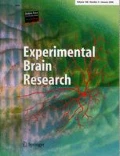Abstract
There is increasing evidence that cerebellar deficit may be a causal factor in dyslexia. The cerebellum is considered to be the major structure involved in classical conditioning of the eyeblink response. In a direct test of cerebellar function in learning, 13 dyslexic participants (mean age 19.5 years) and 13 control participants matched for age and IQ undertook an eyeblink conditioning experiment in which for 60 acquisition trials an 800-ms auditory tone (conditioned stimulus, CS) was presented. On 70% of the trials an 80-ms corneal airpuff (unconditioned stimulus, US) was presented 720 ms after the tone onset. The cerebellar deficit hypothesis, uniquely of the causal hypotheses for dyslexia, predicts that the dyslexic participants would show abnormal performance in the incidence and/or timing of the conditioned response (CR) of an eyeblink in response to the tone (and before the US). Three of the dyslexic group showed no conditioning at all. Furthermore, the dyslexic group showed significantly worse “tuning” of the CR timing, together with significantly reduced habituation of the orienting response (OR) to the CS. Individual analyses indicated that 85% of the dyslexic group showed either no conditioning or abnormally poor CR tuning and/or abnormally low OR habituation. It is concluded that the findings provide further converging evidence of cerebellar abnormality in dyslexia and for the first time demonstrate that there are fundamental abnormalities in the way that dyslexic people learn. Equally important, the eye blink conditioning paradigm provides a method of investigating further both homogeneity and heterogeneity in the learning deficits underlying dyslexia and other developmental disorders.
Similar content being viewed by others
Author information
Authors and Affiliations
Corresponding author
Rights and permissions
About this article
Cite this article
Nicolson, R.I., Daum, I., Schugens, M.M. et al. Eyeblink conditioning indicates cerebellar abnormality in dyslexia. Exp Brain Res 143, 42–50 (2002). https://doi.org/10.1007/s00221-001-0969-5
Received:
Accepted:
Published:
Issue Date:
DOI: https://doi.org/10.1007/s00221-001-0969-5




